On Wednesday, October 27, a walkout organized by the Student Workers of Columbia in anticipation of their November 3 strike deadline culminated in protestors entering President Bollinger’s “Freedom of Speech and Press” class, forcing its cancellation.
After last semester’s strike and negotiations failed to reach a contract, the Student Workers of Columbia again authorized a strike with a union vote in September. A walkout was scheduled for today as part of the lead-up to the strike, which will begin Wednesday, November 3 unless the final bargaining session before the deadline, set for 3 pm on Thursday, October 28, leads to a contract agreement.
Throughout the day, there was union activity at the sundial on College Walk, with people beginning to flood just before 3 pm—the time the walkout was scheduled to start. Thomas Preston, a sixth-year graduate student in the German department, moderated the protest, which included chanting, music, and Preston’s “stand-up” about student worker conditions at Columbia. “What do you call a 30-year-old whose parents have to pay for the shirts he teaches in?” Preston asked the crowd. The answer: “A Columbia graduate student.”
In addition to these activities, a number of student worker speakers voiced specific grievances that they had with the administration’s treatment of student workers and were met with alternating cheers, boos, and cries from the enthusiastic crowd. These speeches included accusations that Columbia changed the stipend schedule as a means of retaliation against the student workers for striking last year (in September, the SWC announced that they have filed a charge with the National Labor Relations Board against this change), complaints that the administration was only proposing contracts that would provide no meaningful changes to workers, and personal testimonies about how “I’m striking because I can’t afford not to.”
Throughout the protest, attending undergraduate students reported the disruption the walkout caused to their classes and meetings. One sophomore in Nadia Urbinati’s 2:10 pm Contemporary Civilization class told a Bwog reporter that Professor Urbinati canceled class following the noise disruption, audible in Hamilton 302. Other undergrads joined their graduate student instructors in walking out of their class to participate in the walkout: When Preston asked if there were any in attendance, he was met with cheers throughout the crowd.
The greatest disruption, however, came at the end of the hour of speeches, when Preston announced the “afterparty” of the event: Going to Schermerhorn 501 to disrupt President Bollinger’s 4:10 pm class, “Freedom of Speech and Press.”
Protestors marched from the sundial at the center of campus to the Schermerhorn plaza while chanting “No contract, no work!” and “Bollinger in your ivory tower, we’ll fight you with union power!” They then entered Schermerhorn, occupying the fourth floor on the campus level. The shouts were heard by the students in Bollinger’s class, with him joking: “You know, it’s hard… This is what makes the First Amendment difficult,” as captured in a video taken by a Bwog staffer. Bollinger tried to continue the class multiple times, before a few protestors entered the room chanting “fuck you, PrezBo” and “No contract, no work!” After one student left the classroom, an organizer told the remaining students: “Let’s go, let’s get up and leave, y’all! Let’s go! Got a mob outside, join us.” President Bollinger then closed his books and put his mask back on, silently signaling that class was done for the day. Bollinger then presumably exited the building through an unknown route, not intersecting with the crowd outside Schermerhorn.
The announcement of the class’ cancellation trickled through the mass of protestors both in the building and outside it, leading to a round of cheers and more chants of “No contract, no work!” Once all protestors were back outside, having successfully interrupted President Bollinger’s class, organizers announced a new target: President Bollinger’s house.
The march to the president’s house proceeded with the same chants used prior, mostly “No contract, no work!” After 20 minutes of chanting and a brief speech by one protestor, the crowd then decided to head back to campus, chanting that they’ll return.
One of the undergraduates who said “fuck you” to Bollinger’s face in the classroom, who preferred to be named anonymous, said that the cursing was “well deserved.” The source said “I never would have said something like that to an individual who didn’t deserve it,” elaborating on the lack of health and dental care Columbia gives to graduate students at “one of the most prestigious universities in the world.”
Another protestor and the final speaker of the initial walkout, Manuela Luengas (GSAS ’23), said that she was “extremely moved to see so many undergrads that are willing to support and fight with us.” She said she’s striking because she “can’t afford [her] basic needs [in the city]” in addition to being “scared as a woman of being harassed in the workplace.”
The walkout finally ended back where it had started: the heart of campus, though this time on Low Steps. Protestors held up signs and posters and finished with a final chant: “We’ll be back, and we want our money back.”
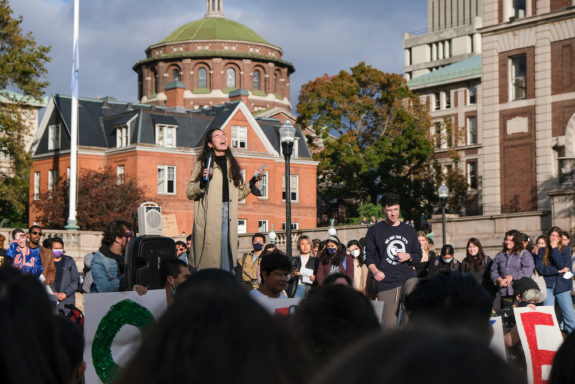
Manuela Luengas speaking at the walkout 
Posters by SWC members 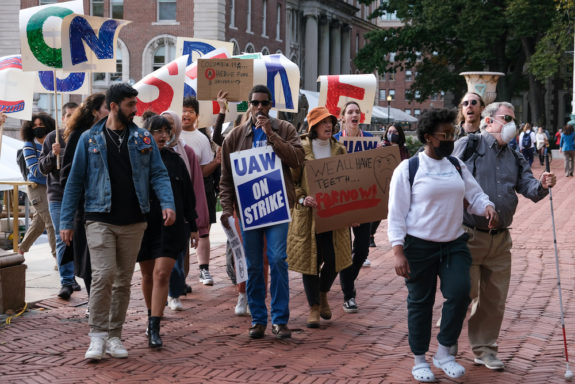
En route to Schermerhorn 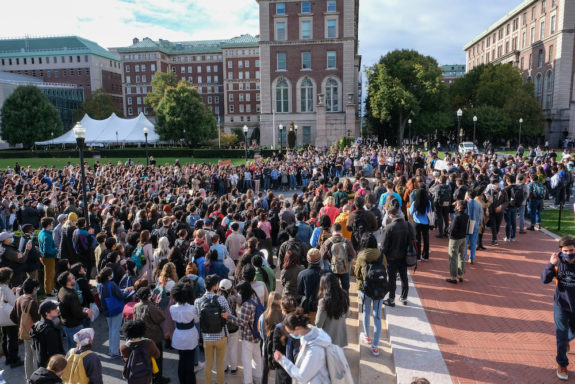
Walkout 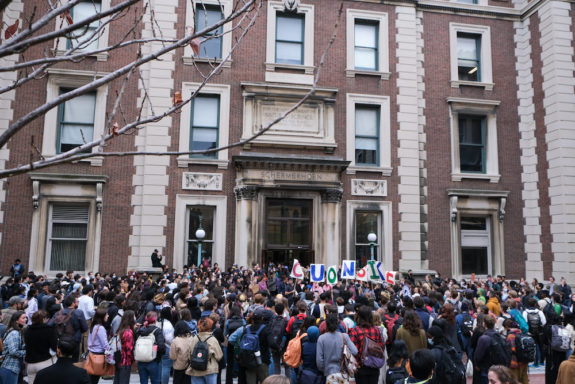
At Schermerhorn plaza 
Holding traffic at Amsterdam for protestors to pass 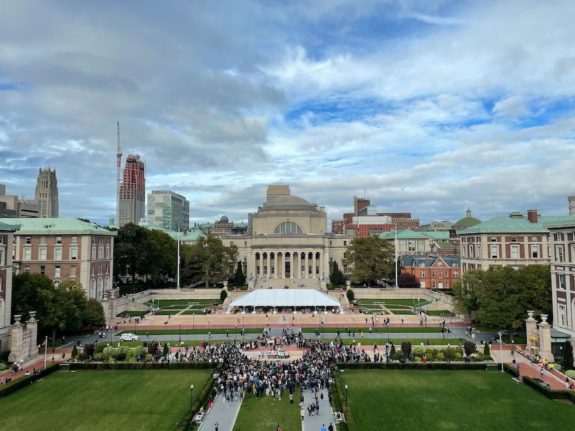
Perspective of walkout from Butler
UPDATE Thursday, October 28, 9:55 pm:
Columbia students received an email at 9:31 pm Thursday night from Dennis A. Mitchell, Columbia’s Executive Vice President for University Life regarding Wednesday’s protest.
“I write to you today not because the class was taught by Lee Bollinger, University President, but because I believe it is important to clearly establish that disrupting any faculty member and any group of students in the midst of teaching and learning – literally shutting down a class in session, robs all in attendance of their opportunity to learn. Mitchell wrote. “Most importantly, disrupting a class – any class – undermines one of our core University values – freedom of expression.”
The email then went on to remind students of the University Rules of Conduct, which “underscore the University’s commitment to the free exchange of ideas, and in doing so, only limit two things: the time and place and manner of public expression, and speech that presents a clear and present danger to others.”
“There is a broad list of what constitutes either a simple or serious violation of the Rules; yesterday’s classroom disruption would be considered a serious violation because it ‘disrupt(ed) a University function’ and ‘rendered its continuation impossible.’ Rather than stifling protest, the Rules encourage sharing ideas and active debate, while protecting each community member’s right to listen, to learn, and to express their own ideas,” the email said.
Read the full email below:
Dear Students,
Yesterday a group of students marched into Schermerhorn Hall and disrupted a class in progress. I write to you today not because the class was taught by Lee Bollinger, University President, but because I believe it is important to clearly establish that disrupting any faculty member and any group of students in the midst of teaching and learning – literally shutting down a class in session, robs all in attendance of their opportunity to learn. Most importantly, disrupting a class – any class – undermines one of our core University values – freedom of expression.
The robust exchange of ideas and viewpoints, even when uncomfortable, allow us to learn and further develop our own thinking. The ability to hear ideas, engage with them and determine your own views is the purpose of an education. Universities have long been the hallowed ground of new ideas and dissenting opinions, none of which would be possible without freedom of expression. This value is at the heart of the mission of every University, and it must be protected.
The University Rules of Conduct are part of the University Statutes, and were adopted by the Trustees. The Rules maintain that “the University is the place for received wisdom and firmly held views to be fully tested and then tested again, so that members of the University community can listen, challenge each other, and be challenged in return.”
The Rules underscore the University’s commitment to the free exchange of ideas, and in doing so, only limit two things: the time and place and manner of public expression, and speech that presents a clear and present danger to others. There is a broad list of what constitutes either a simple or serious violation of the Rules; yesterday’s classroom disruption would be considered a serious violation because it “disrupt(ed) a University function” and “rendered its continuation impossible.” Rather than stifling protest, the Rules encourage sharing ideas and active debate, while protecting each community member’s right to listen, to learn, and to express their own ideas. I encourage you to learn more about the Rules here.
I want to acknowledge what many of you may feel, this is a time of intense emotion on our campuses. There are challenges to discuss and to overcome. After more than 18 months away we have returned as a University community, and there is much that each of us needs to express – both in and outside of the classroom. At Columbia, we expect nothing less than active participation, expression and engagement on any and every issue, especially on challenging topics. But that engagement must allow space for all opinions and never infringe on another Community member’s opportunity to learn.
Respectfully yours,
Dennis A. Mitchell, DDS, MPH (he/him/his)
Executive Vice President for University Life
Senior Vice Provost for Faculty Advancement
Professor of Dental Medicine at CUMC
Images via Charlie Bonkowsy, Kyle Murray, and Eli Reville
Linus Glenhaber, Caroline Mullooly, Lillian Rountree, and Sarah Braner contributed to reporting.


 8 Comments
8 Comments
8 Comments
@Anonymous 2+2 = 5
The future belongs to those who control the past, the past belongs to those who control the present.
@anon Disrupting Bollinger’s class and shouting “Fuck you”–is that how this union goes on strike? Do these graduate students consider themselves “professionals” worthy of respect? Based on this behavior, I don’t, and they have just shot themselves in the foot with this stunt. As an adjunct with over 20 years’ experience teaching at Columbia, I already envy their current compensation.
@Anonymous If Columbia treats their graduate students with this much disregard and disrespect, imagine how they view undergraduate students. Columbia’s treatment of graduate students is indicative of their view of the entire student body– this is not only a graduate student issue– this is an institutional issue that reveals the hypocrisy of Columbia’s purported values.
@Anonymous Undergrads are full time students, not workers. They don’t get every free like the grad students do.
@Anonymous Assuming an undergrad is unempathetic and only cares about their education. They could be angry at grad students for striking or angry at admins for not meeting the demands. Seeing that grad students have struck for – I believe – the past four years it is becoming a losing mans game to be upset at the grad students because they will not stop. Thus, if you are a unempathetic undergrad it would make sense to be upset with admins (tell them to fix grad student situation), so the undergrad can get back to recieving an education.
There is also the empathetic undergrad which would be upset at the admins because of the gradstudents’ plight.
Also I think there is little to no moral weight in being empethetic or unempethitic: one ought not be one or the other. This might throw a wrench into my arguement, but it is truly a question of the scope of one’s personal responsibility which is finite.
@Anonymous Undergrads should be angry at the grad students disruption of the campus.
@Anonymous Undergrads should be angry at the shameless lack of respect the university has for its grad students
@Anonymous did presbo write this